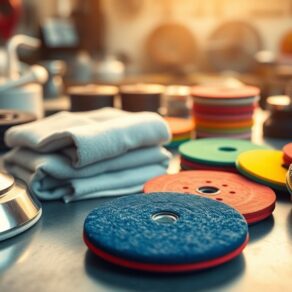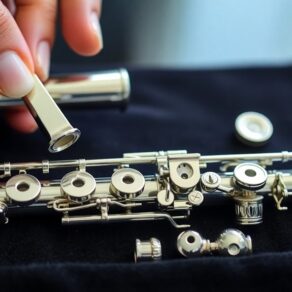To maintain your instrument's performance, start with a regular cleaning routine. Wipe down the exterior daily, and clean the interior weekly using appropriate swabs. Inspect pads and corks for damage and replace them as necessary. Keep your flute dry to prevent moisture-related issues; use a cleaning rod after each play session. Store it properly in a sturdy case, avoiding heat and direct sunlight. Finally, schedule professional servicing at least once a year or more if you play frequently to guarantee everything runs smoothly. There's much more to learn about maximizing your instrument's lifespan and performance.
Key Takeaways
- Establish a regular cleaning routine to enhance your instrument's performance and longevity.
- Inspect pads and corks regularly to ensure optimal functionality and replace any damaged parts.
- Keep your instrument dry by using cleaning rods and microfiber cloths to absorb moisture.
- Store your instrument properly in a sturdy case, away from heat sources and direct sunlight.
- Schedule professional servicing at least once a year to maintain sound quality and prevent further issues.
Establish a Regular Cleaning Routine
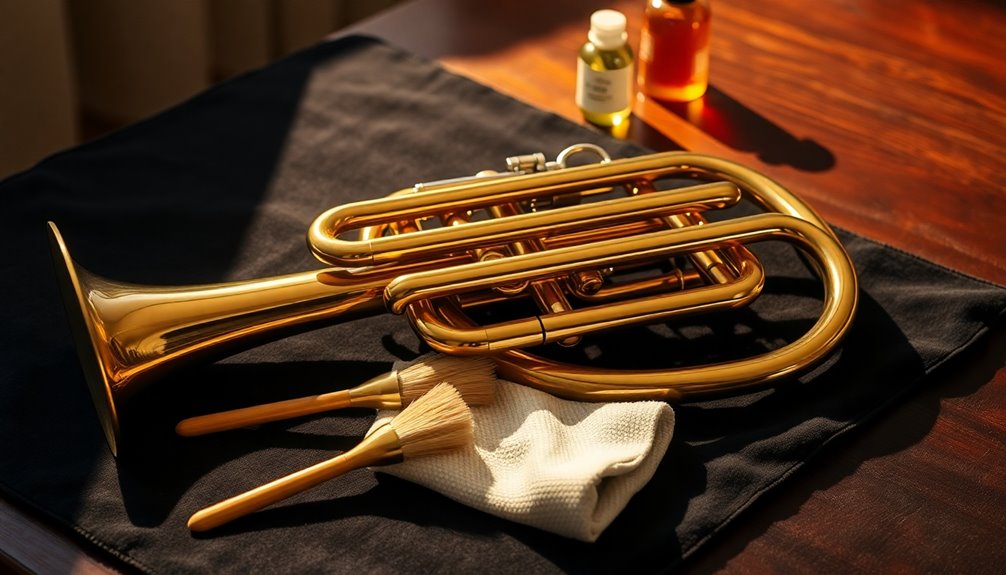
Regularly establishing a cleaning routine for your instrument is essential to maintain its performance and longevity. A consistent cleaning schedule not only keeps your instrument in peak condition but also enhances your playing experience.
Start by gathering the necessary cleaning supplies, which typically include a soft cloth, cleaning swabs, and appropriate lubricants specific to your instrument type.
Your maintenance schedule should incorporate daily, weekly, and monthly cleaning tasks. After each use, wipe down the exterior of your instrument with a soft cloth to remove moisture and fingerprints.
Weekly, make sure to clean the interior with cleaning swabs to eliminate dust and debris that can affect sound quality. For brass instruments, consider applying appropriate oil to the valves to guarantee smooth operation.
Monthly, check for any buildup that could compromise the functionality of your instrument. If you notice any areas where dirt has accumulated, take additional time to clean those spots thoroughly. Regular use of a flute cleaning kit can help prevent moisture buildup and corrosion.
For woodwind instruments, maintain a schedule for changing reeds and adjusting pads. Staying proactive about these tasks prevents more significant issues down the line, fostering both your instrument's lifespan and your overall musical growth.
Inspect Pads and Corks
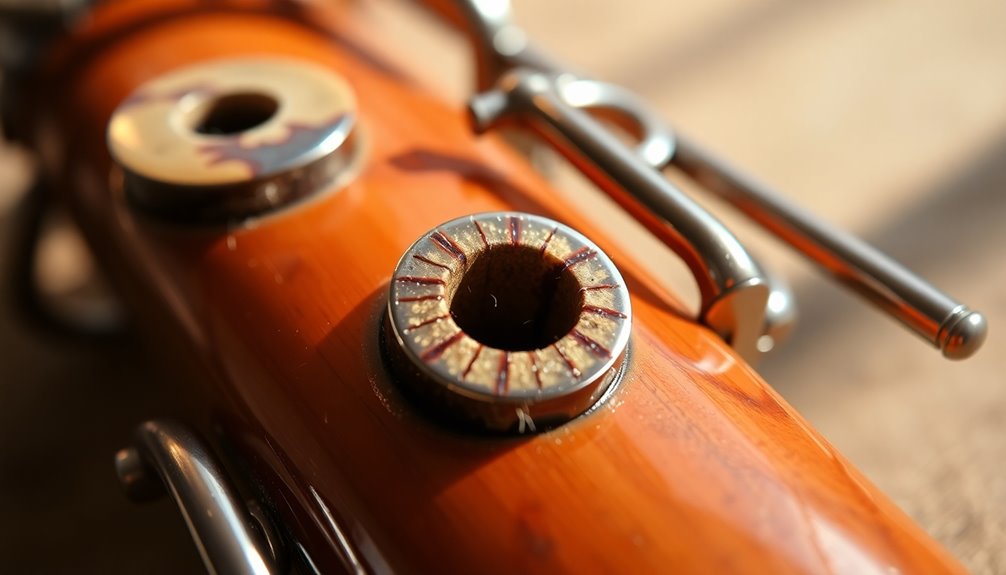
After maintaining a consistent cleaning routine, it's important to turn your attention to inspecting the pads and corks of your instrument. Regular inspection guarantees peak performance and longevity. Over time, pads can become worn, and corks can dry out or deteriorate, affecting the instrument's seal and sound quality.
Inspection Checklist
| Component | Signs of Wear |
|---|---|
| Pads | Discoloration, cracks, or peeling |
| Corks | Dryness, crumbling, or looseness |
| Key Mechanisms | Unresponsiveness, sticking |
| Springs | Weakness, corrosion |
| Tone Holes | Obstructions, dirt accumulation |
Start by checking the pads. If you notice any damage, it's time for pad replacement. Look for softening or stiffness, as these can affect the pad's ability to seal properly. When pads are compromised, they may create leaks, leading to poor sound production.
Next, focus on cork maintenance. Inspect corks for signs of dryness or crumbling, which can hinder the alignment of the instrument. A well-maintained cork guarantees that keys function smoothly and create a proper seal. If you find any issues, consider replacing the corks to avoid further complications. Regular cleaning with high-quality maintenance tools can enhance the longevity of your instrument.
Keep Your Flute Dry
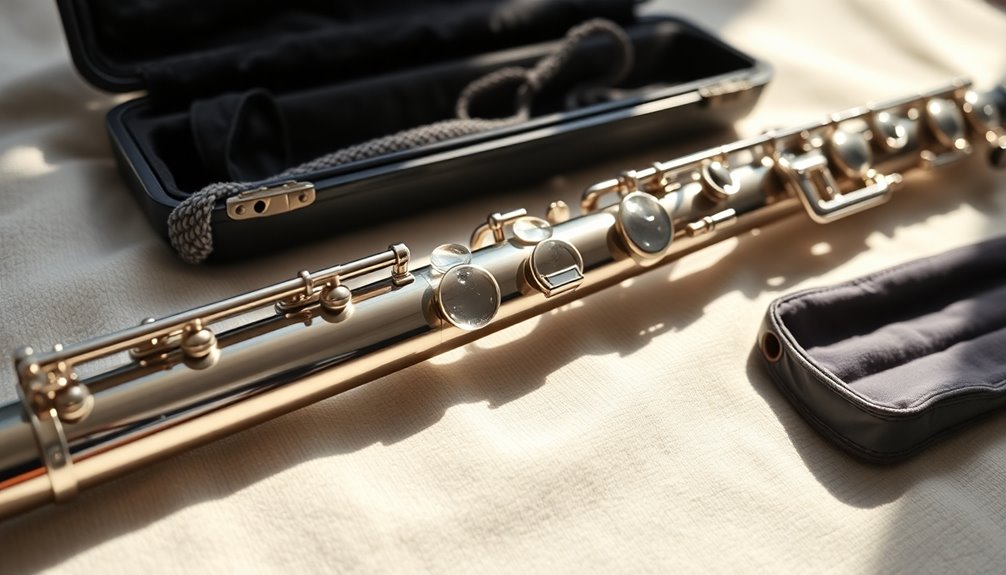
Moisture can wreak havoc on your flute, leading to corrosion and diminished sound quality. To guarantee peak performance, you need to prioritize moisture control.
Here are some practical tips to help you keep your instrument dry and in top condition:
- Use a cleaning rod: After each playing session, insert a cleaning rod with a soft cloth to absorb moisture inside the flute.
- Wipe down the exterior: Use a microfiber cloth to remove any moisture from the surface. This simple step can prevent water spots and potential corrosion.
- Store in a dry environment: Avoid leaving your flute in humid places. A climate-controlled space is ideal for maintaining its integrity.
- Avoid excessive condensation: When playing in colder or more humid environments, consider using a flute cover or absorbent cloth to minimize the effects of condensation.
- Regular inspections: Check your pads and corks for signs of moisture damage. Replace them as needed to maintain peak performance.
- Perform routine maintenance: Regularly inspect your flute's key lubrication to ensure smooth action and prevent moisture-related issues.
Store Properly When Not in Use
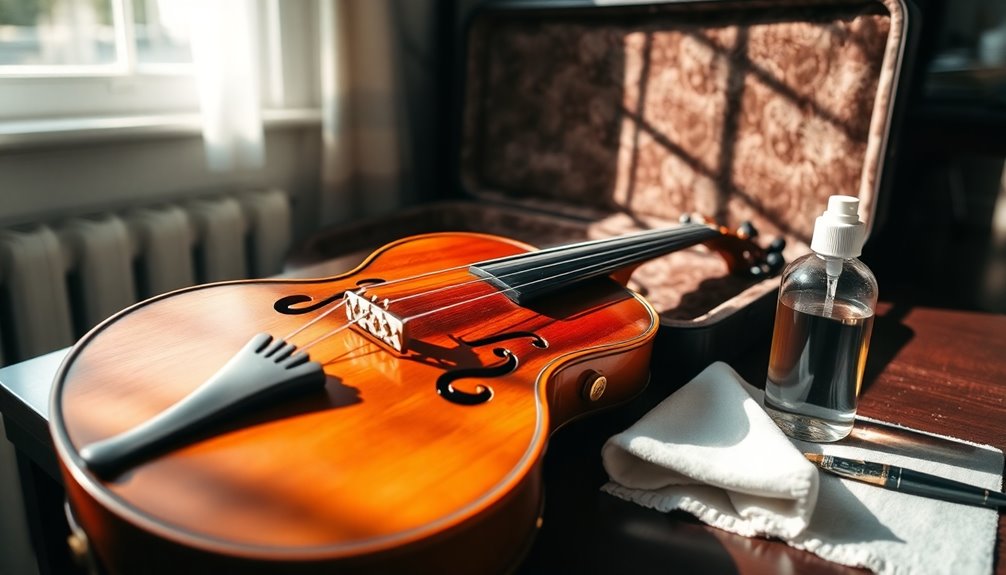
Keeping your flute dry is just the first step; storing it properly when not in use is equally important for maintaining its longevity and performance. Proper storage protects your instrument from environmental factors that could lead to damage, such as temperature fluctuations and excessive humidity.
Always use a sturdy case designed specifically for your flute. The case not only provides physical protection from drops or scratches but also plays a vital role in humidity control. Guarantee the case is lined with a soft material to prevent scratches and dents. Additionally, consider placing silica gel packets inside the case to absorb moisture, especially if you live in a humid area.
When you store your flute, avoid placing it near heat sources like radiators or direct sunlight, as these can warp the materials. Instead, choose a cool, dry location. It's also advisable to keep the flute upright in its case, as this minimizes pressure on the keys and pads.
After each use, always disassemble your flute and clean it thoroughly before storage. This practice prevents moisture accumulation, which can lead to mold or corrosion over time. Using a comprehensive cleaning kit, such as the Libretto Flute Care Kit, ensures you have all the necessary tools for effective maintenance.
Finally, establish a routine for checking your storage conditions. If your environment tends to be humid, invest in a hygrometer to monitor levels and adjust your humidity control measures accordingly.
Schedule Professional Servicing
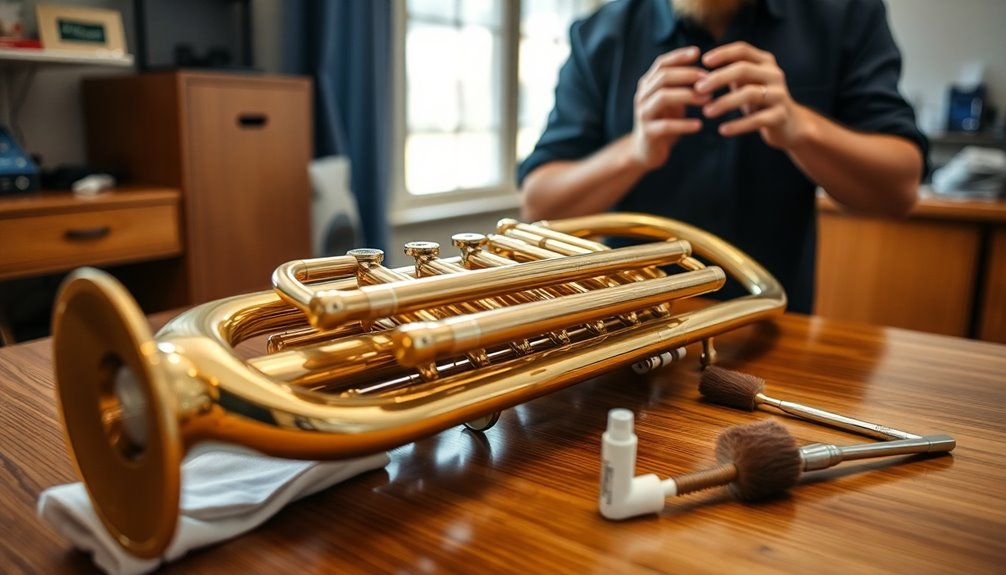
Regularly scheduling professional servicing is essential for maintaining your flute's best performance and longevity.
A professional technician can identify issues that may not be visible to the untrained eye and provide the necessary adjustments to keep your instrument in peak condition.
It's important to establish a routine maintenance frequency based on your playing habits and the environmental conditions where you store your flute.
Consider the following points when planning your servicing schedule:
- Frequency: Aim for at least once a year, or more often if you play frequently.
- Signs of Wear: Pay attention to changes in sound quality, key responsiveness, or mechanical issues.
- Seasonal Changes: Humidity and temperature fluctuations can affect your flute, so check in after significant seasonal shifts.
- Cleaning Needs: Regular cleaning at home is important, but professional deep cleaning is essential for long-term care.
- Repairs: If you notice any damage, don't wait. Schedule a visit with a technician right away to prevent further issues.
Additionally, ensure that you maintain a routine cleaning schedule to prolong your instrument's life and prevent tarnish.
Frequently Asked Questions
How Often Should I Replace My Instrument's Pads and Corks?
You should assess your instrument's pads and corks regularly.
Generally, pad replacement frequency depends on usage; if you play frequently, consider replacing pads every 1-2 years.
For corks, check for wear and tear every few months; they might need replacement sooner if they show significant damage.
Following these cork maintenance tips can help guarantee your instrument performs at its best, enhancing your playing experience and keeping you connected with your musical community.
Can I Use Water to Clean My Instrument?
Imagine your instrument as a finely tuned engine, ready to roar. You can certainly use water to clean it, but be cautious about the type.
Distilled water is best, as it's free of minerals that could leave harmful deposits. Avoid submerging it; instead, use a damp cloth and gentle cleaning methods tailored to your specific instrument.
This way, you'll maintain its beauty and function, ensuring it sings in harmony for years to come.
What Tools Do I Need for Regular Maintenance?
For regular maintenance, you'll need some essential tools to keep your instrument in top shape.
Start with a maintenance checklist that includes items like cleaning cloths, a soft brush, and lubricant specific to your instrument type.
A screwdriver set can help with minor adjustments, while a tuning device guarantees you're always in pitch.
Having these tools handy makes it easier to perform routine checks and guarantees your instrument stays reliable and sounds great.
How Can I Tell if My Instrument Needs Professional Servicing?
To determine if your instrument needs professional servicing, watch for performance indicators like persistent pitch problems or unusual sounds.
Regularly consult servicing frequency guidelines to align with your instrument's needs. If you notice sticking keys or inconsistent tone, it's a signal for specialized support.
Don't hesitate to reach out; ensuring peak function fosters a feeling of belonging within your musical community.
Prioritize your instrument's health to maintain its melodic magic!
What Should I Avoid When Cleaning My Instrument?
When cleaning your instrument, avoid harsh cleaning products like bleach or ammonia, as they can damage finishes and materials.
Stick to gentle, recommended cleaning solutions specifically designed for your instrument type.
Don't use abrasive cleaning techniques that could scratch surfaces or cause wear over time.
Always check for compatibility with your instrument's components before applying any product, ensuring your cleaning routine keeps your instrument in top shape without compromising its integrity.
Conclusion
By combining regular maintenance with professional servicing, you guarantee your instrument remains in peak condition, striking a balance between self-care and expert attention. While daily cleaning prevents grime buildup, a yearly check-up catches hidden issues before they escalate. Just as you wouldn't ignore a vehicle's oil change, don't overlook your flute's needs. With diligence and care, you can enjoy the sweet sound of your instrument for years to come, harmonizing longevity and performance seamlessly.




